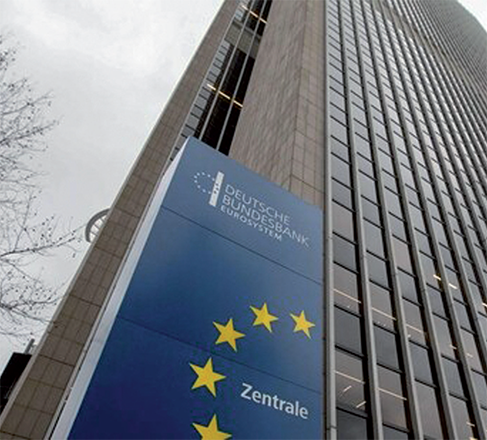You are here
Germany cuts public debt to 2.15 trillion euros
By AFP - Apr 02,2016 - Last updated at Apr 02,2016

Two building cleaners clean the 27-metres-high glass ceiling of a building in Dresden, Germany, on Wednesday (AP photo)
FRANKFURT — Germany, Europe's biggest economy, shaved 24 billion euros ($27 billion) off its overall public debt burden to 2.153 trillion euros in 2015, the country's central bank, or Bundesbank, said last week.
Measured against the gross domestic product (GDP), that meant Germany's total public debt ratio fell to 71.2 per cent last year from 74.7 per cent in 2014, the Bundesbank calculated.
Under European Union (EU) rules, a member state's overall debt must not exceed 60 per cent of GDP.
Nevertheless, the EU average stands at 86 per cent and Germany has pledged to bring its own debt back below the 60 per cent limit by 2020.
Germany's public finances have been in surplus since 2014, thanks to the robustness of its domestic economy, and low interest rates and the government is using the budget surplus to bring down its overall debt.
The Bundesbank calculated that GDP growth of 1.6 per cent last year accounted for 2.7 percentage points of the reduction in the overall debt ratio.
German economy to slow down in second quarter: Bundesbank
Also last week, the Bundesbank said the German economy will likely slow down in the second quarter after showing steady growth in the year's first three months.
"The German economy started 2016 with a lot of momentum," it added in its latest monthly report. However "a decline in the pace of economic growth looks to be on the horizon for the second quarter".
The Bundesbank recalled that the German economy had seen "a solid rate of expansion" in the second half of 2015 with growth in the third and fourth quarters of about 0.3 per cent, which it said "largely matched its potential".
The bank forecast first-quarter growth would match or slightly surpass that rate.
However it said stagnating industrial orders and a further worsening of the closely watched Ifo business climate index, including a sharp decline in its previously stable production and export expectations indices, did not bode well for the second quarter.
International demand for German goods had long kept the country largely insulated from external shocks including the slowdown in Chinese growth and other emerging markets as well as geopolitical tensions.
But the combined effect of negative factors is starting to be seen in certain indicators.
For the moment "the mood of consumers remains very optimistic", the Bundesbank said, after domestic consumption replaced exports last year as the primary engine of economic growth.
Speaking at the Bundesbank's annual news conference, President Jens Weidmann said the German economy was "in good shape overall" and hailed a "distinct rise" in real disposable income, due in part to low inflation.
For 2016 as a whole, the Bundesbank is pencilling in growth of 1.8 per cent, slightly more than the government's forecast of 1.7 per cent.
Separately, German companies are trying not to let themselves be spooked by the economic slowdown in China, even if they concede they are currently seeing a drop in demand for their products there.
"Of course we're experiencing a fall-off in demand in China at the moment," said Franz Hampel, head of Garant-Moebel, a furniture wholesaler.
"Our Chinese partners have become jumpy. Business has been good for them the past few years. But they're now asking themselves what the future will bring," Hampel added.
Employing a workforce of around 230 and active in around 20 countries, Garant-Moebel opened an office in Hong Kong two years ago where it employs a dozen people.
However, the strong fluctuations in the Chinese currency, the yuan, resulting from the country's recent financial woes, are leading Chinese furniture retailers to roll back business, Hampel continued.
Garant-Moebel is not alone in watching economic developments in People's Republic with a wary eye.
"It seems obvious that the period of double-digit growth is behind us," said Jan-Christoph Block, head of international sales at drive systems specialist Getriebebau Nord in Bargteheide, north Germany. "It's still possible to achieve growth, but it's become more difficult."
Both companies can be seen as representative of the mostly family-owned small and medium-sized enterprises (SME) that form the backbone of the German economy and were quick to establish a foothold in China.
It is not just big companies like Volkswagen, BMW and BASF that are suffering from China's woes, the SMEs are feeling the pinch too.
'Enormous potential'
China's economic growth is projected to slow to 6.7 per cent in 2016, its lowest growth rate since 1990, from 6.9 per cent in 2015, according to the latest forecasts from the World Bank.
The slowdown is worrying for German exporters, since China is their most important market after Europe and the United States.
In 2014, Germany exported a total 74 billion euros ($81 billion) worth of goods to China, not including the sales generated by companies' local subsidiaries in China.
According to the specialist consultancy firm EAC, some of the major players listed on the Frankfurt stock exchange generated combined turnover in China of 131 billion euros in 2014, an increase of nearly 10 per cent over the previous year.
So it hardly comes as a surprise that the market turbulence in China has left its mark on Germany's blue-chip DAX 30 index, too. It has lost more then 7 per cent since January 1.
Nevertheless, China's "enormous growth potential remains", said Block of Getriebebau Nord.
"Currently, more than 5,200 German companies are active in the People's Republic, employing a combined workforce of more than 1 million there," said Alexandra Voss, head of the German Chamber of Commerce in China.
"The economic slowdown in China will certainly not be painless. But the huge growth potential remains," Voss told AFP.
A number of companies are hoping to benefit from the massive investment programme launched by Beijing to transform China from the world's biggest factory to the world's leading market place for innovation in services and technology. And the sectors covered by German companies were "particularly well placed" to take advantage of this, said Voss.
UniCredit economist Erik Nielsen also argued that "concerns over China are overdone".
China's "real economy leaves no particular reason to worry, at least not in the short term," Nielsen said.
Related Articles
FRANKFURT — Germany's "lacklustre" economy will likely stagnate again in the third quarter, the Bundesbank central bank said Monday, as weak
FRANKFURT — Germany's Bundesbank took more than 200 tonnes of its gold back to Frankfurt from overseas last year, the central bank said on W
The German central bank or Bundesbank said Monday that it stepped up the repatriation of its gold reserves from overseas storage last year.


















